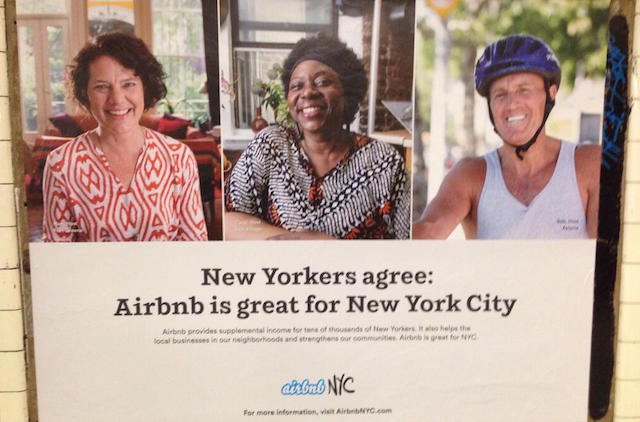Hotels Are People Too

It’s increasingly hard to escape the sensation that the primary proprietors of the so-called sharing economy don’t so much share as take — from their users, from their contracted workers, from the localities in which they operate, by utilizing infrastructure that they do not contribute toward. It’s everybody else who shares.
The New York State Attorney General’s initial report on Airbnb in New York City, which analyzed full-apartment bookings (crucially, not room shares) with the service from 2010 until this past June, feels fairly conclusive in this regard. Even if you absolutely do not care at all that, according to the attorney general, seventy-two percent of the private bookings on Airbnb are technically illegal, or that real hotel operators are losing out hundreds of millions of dollars in bookings, or even maybe that the city has lost tens of millions of dollars in taxes the city has lost to Airbnb and its hosts, it’s frankly easy, as a renter in New York City (I mean, Jesus) to feel supremely agitated that last year, more than four-and-a-half thousand apartments listed on Airbnb were booked for short-term rentals for three months of the year or more, and of those, nearly half were booked by half the year or more — meaning apartments that could and should have been on the market were being largely used as hotels. (These apartments accounted for thirty-eight percent of the revenue to Airbnb and its hosts from units booked as private short-term rentals, according to the attorney general.)
And these are, in all likelihood, prime apartments! For all of Airbnb’s feel-good posturing in subway ads throughout the city, beaming that it’s bringing in income for strapped, individual residents throughout the metropolis, more than forty percent of the revenue for private rentals came from just three districts in Manhattan — Lower East Side/Chinatown, Chelsea/Hell’s Kitchen, and Greenwich Village/SoHo. (Unsurprisingly, the vast majority of Brooklyn bookings were in Williamsburg, Greenpoint, and what the report calls “brownstone Brooklyn.”) Perhaps these are long-time residents, struggling to hang onto their apartments in long-gentrified neighborhoods, using Airbnb to firm up their deathgrip on their lease. Sure, lol. In many cases it’s not even individuals who are making the money here: Just six percent of hosts did thirty-six percent of private apartment bookings, for thirty-seven percent of the revenue; the host with the most private units, two hundred and seventy-two of them, charged, on average, nearly three hundred and sixty dollars a night. This, in spite of Airbnb making of a show of throwing large-scale operators off of the service when the attorney general first began nosing around.
This is a far cry from a humble, average New Yorker occasionally renting out a room in their apartment to help pay that month’s rent — who would argue against that? not me — it’s exactly the kind of scenario that the 2011 law, which prohibits fully renting New York City apartments for less than a month, is designed to prevent: a gray market hotelier snapping up the apartment you had your eye on after weeks of squinting at Craigslist ads, or worse, droves of them seizing on a newly visible neighborhood, not only elevating rent prices and driving out current residents, but preventing the usual gentrifiers (lol) from ever moving in. Airbnb swore that wasn’t happening, but the data do not lie, as they are so fond of saying in Startuptopia.
In effect, every resident of New York City has been sharing the apartment market they participate in with Airbnb, who has profited handsomely from it; this year the attorney general expects “revenue to Airbnb and its hosts from private short-term rentals in New York City is expected to exceed $282 million.” What it seems that residents get in exchange, mostly, is fewer apartments to choose from, higher rents because of the diminished market, and lesser services from a city deprived of tens of millions of dollars in tax revenue. What is Airbnb sharing with them?
Photo by Richard Robbins
